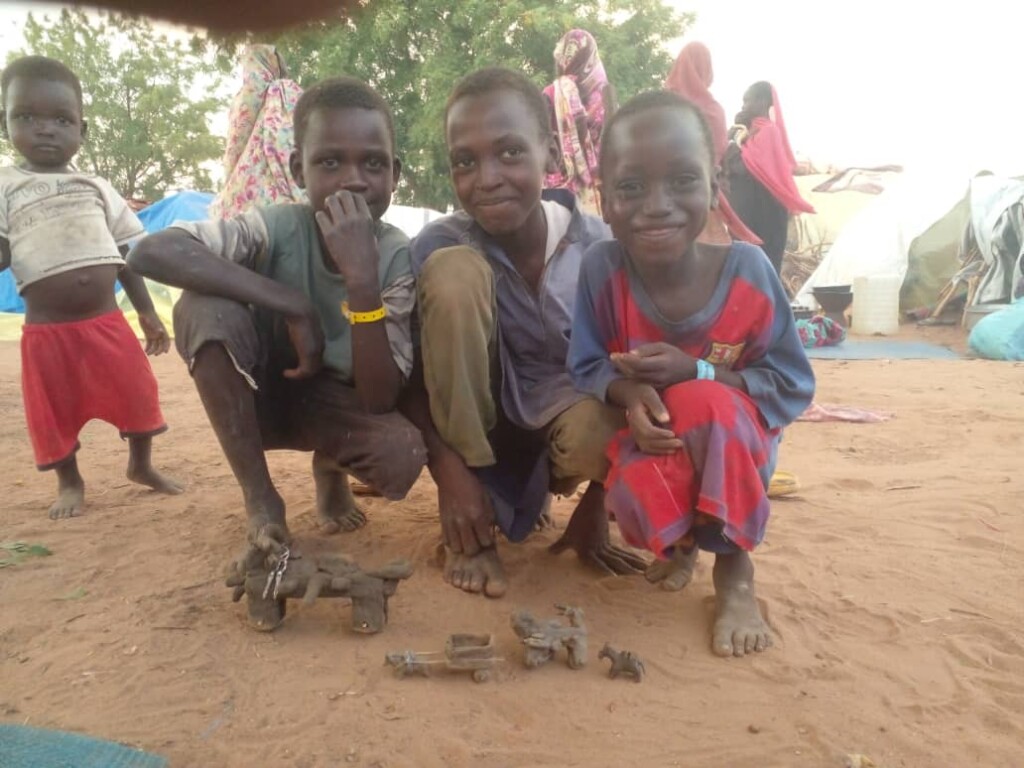Sudanese children face starvation in Chad camp

Refugee children from Darfur playing with clay toys in Adré camp in Chad (Photo: Bashir Adam / Radio Dabanga)
At least five Sudanese refugee children died of starvation last week in Iridimi camp in eastern Chad, as dwindling food supplies and faltering humanitarian aid leave malnutrition in their wake. The dire shortage of nutrition is especially impacting children and seniors.
Reporting the death of yet another child, a Sudanese refugee speaking from Iridimi camp told Radio Dabanga of a lack of integrated food and milk for children, and pointed out that diseases are spreading as the children’s resistance to infection drops.
She stressed that the organisations distributed sums of money in December last year. “The per capita share amounted to SDG11,000, however this is not enough to feed a child,” she says.
The caller says that representatives of the refugees have met with the camp administrators, who inform them that the contracts of organisations working in the camps expired in December. “They sat they are waiting for other organisations to arrive in January, but they have not arrived thus far,” she says.
“We are afraid that we will lose more children of the camp due to malnutrition.”
Centres overwhelmed
As reported by Radio Dabanga in December, Darfuri refugees, who have sought shelter in eastern Chad due to the ongoing war, are grappling with food shortages, inadequate housing, and a scarcity of health facilities. The influx of people escaping from Darfur has overwhelmed the Adré reception centre.
Abdelmonim Adam, a Darfur refugee and human rights activist who found refuge in Adré, not far from the border with Darfur, reported “persistent struggles despite the efforts of the UN Refugee Agency (UNHCR) and organisations operating in the camps”.
“Refugees in Adré, near the border, experience a shortage of services, particularly in terms of insufficient food supplies and inadequate housing,” he explicated.
The surge in arrivals from the Darfur region has strained the refugee reception centre in Adré. Currently, some 10,000 families who sought refuge in the area await transfer to permanent camps.
“Since the onset of the war in April 2023, the UNHCR has responded by establishing five new camps to accommodate refugees from Darfur, with plans underway for a sixth camp”, Adam said, adding that the total number of Sudanese refugees relocated to eastern Chad by the UNHCR since the beginning of the war “stands at around 400,000”.
According to the International Organisation for Migration (IOM) Sudan weekly snapshot covering December 7 to 13, about 594,000 Darfuris crossed the border to eastern Chad since the outbreak of the war in mid-April making Chad the country hosting the highest number of refugees from Sudan.
‘Harsh conditions’
Before the war started, more than 400,000 Sudanese refugees in eastern Chad were already in dire need of food.
On July 20, Radio Dabanga reported that people who had fled the violence in West Darfur to Adré were suffering from harsh conditions, including food shortages and insufficient shelter materials. The World Health Organisation (WHO) reported in late July that at least 65 children died from malnourishment in Chadian refugee camps.
In early August, a joint Chadian-UNHCR team began to transport more than 5,000 Darfuri refugees who were living rough in a makeshift camp near the border, to the Iridimi camp.
Sudanese refugees in the region were also subject to violence. A Darfur resident of the Gaga refugee camp was shot dead at the end of September. A report by the Darfur Women’s Forum showed that Darfuri women in eastern Chad were unable to leave the camps to relieve themselves for risk of rape and other serious attacks.
Radio Dabanga reported in October that more than 10,000 Sudanese refugee families who fled to Chad were living in dire conditions and lack food, shelter, and healthcare.
At beginning of November, Darfuri living in the Iridimi refugee camp demonstrated against the deteriorating security situation in the area, and expressed a “dire need of shelters”.
In late November, Chadian authorities, in cooperation with the UNHCR, facilitated the transfer of refugees from the Adré reception centre and other border areas to the refugee camps in the region. More recent waves of refugees, especially those with relatives already living in Milli refugee camp, moved directly to the camp grounds due to overcrowding at the border.











 and then
and then